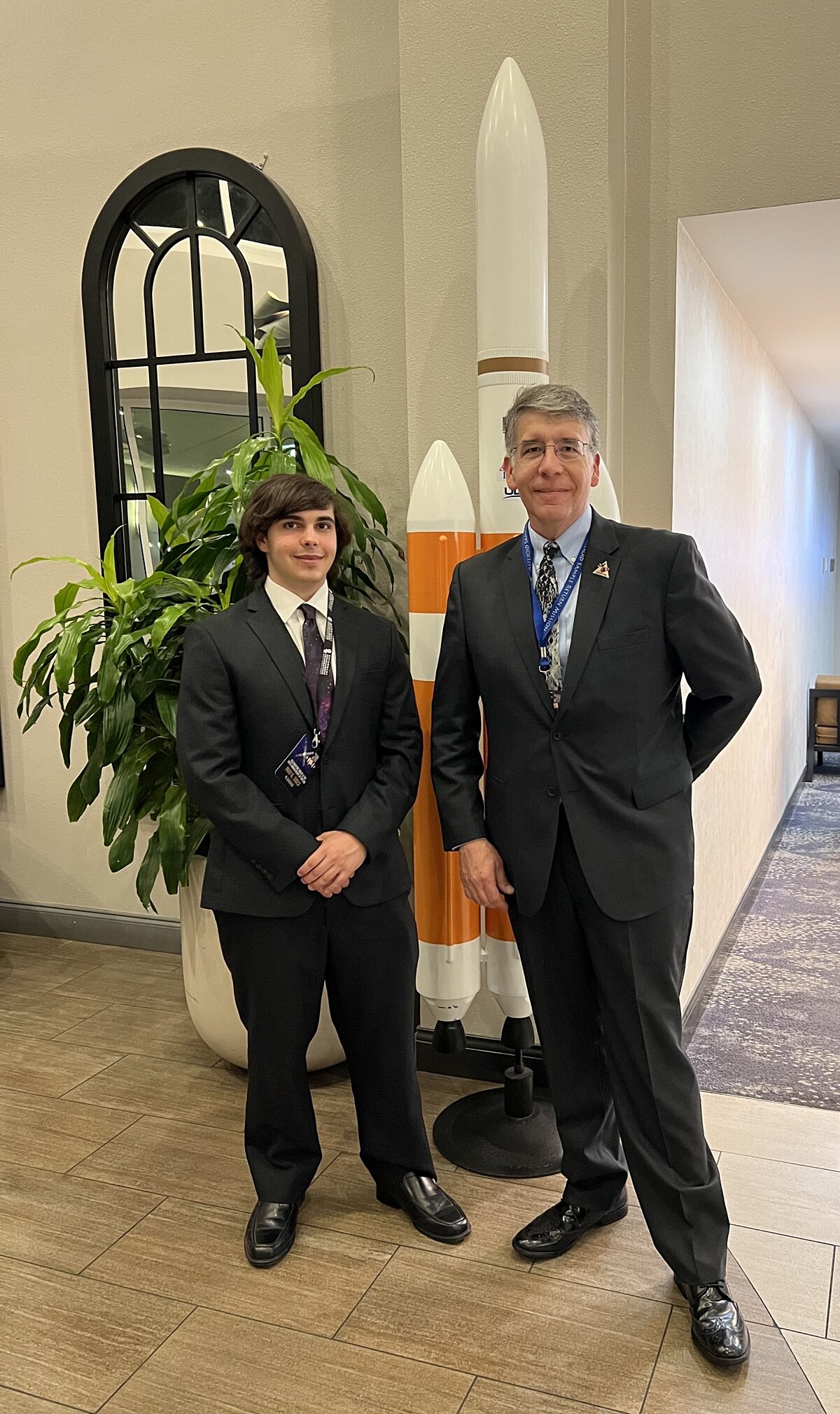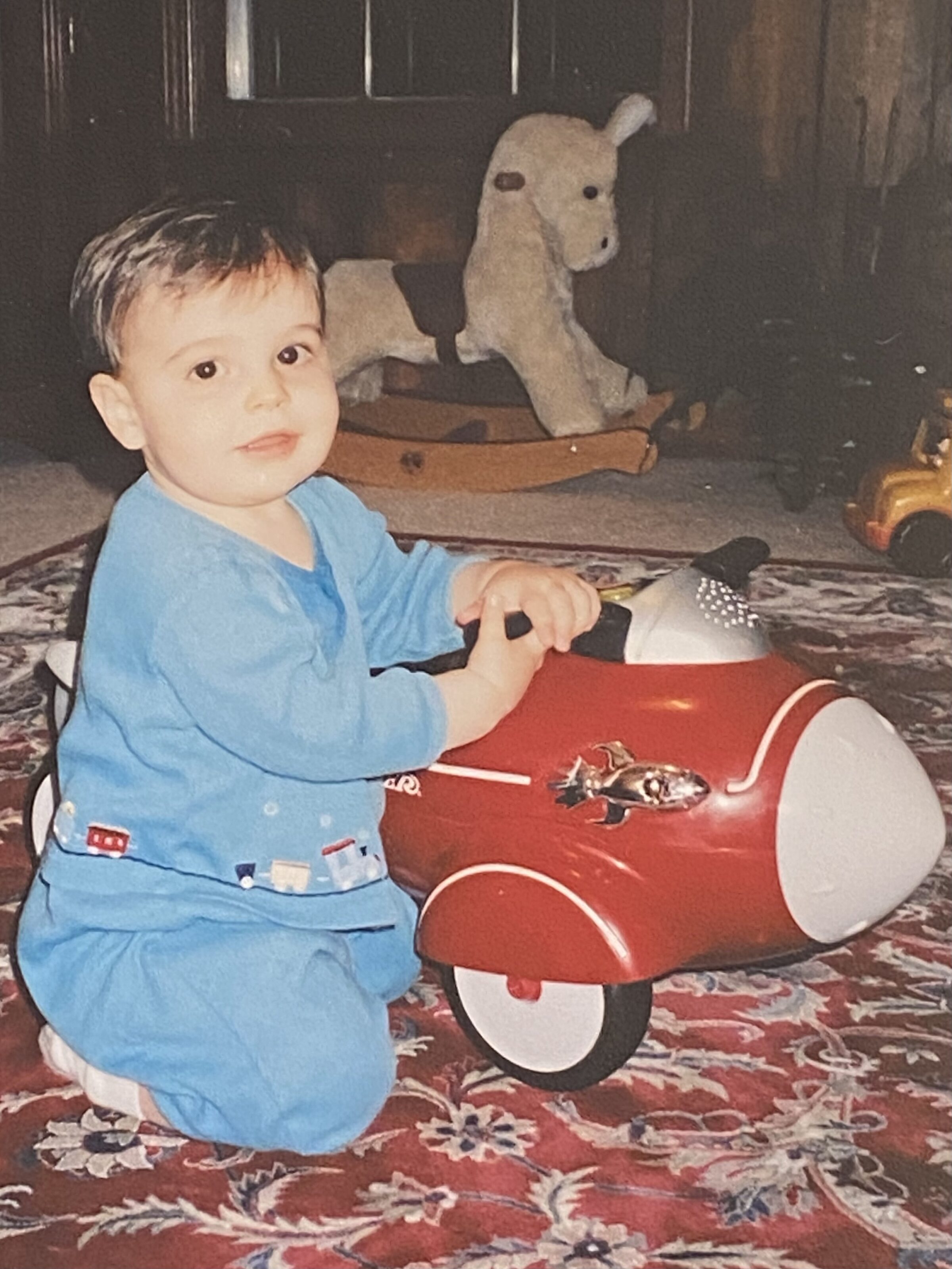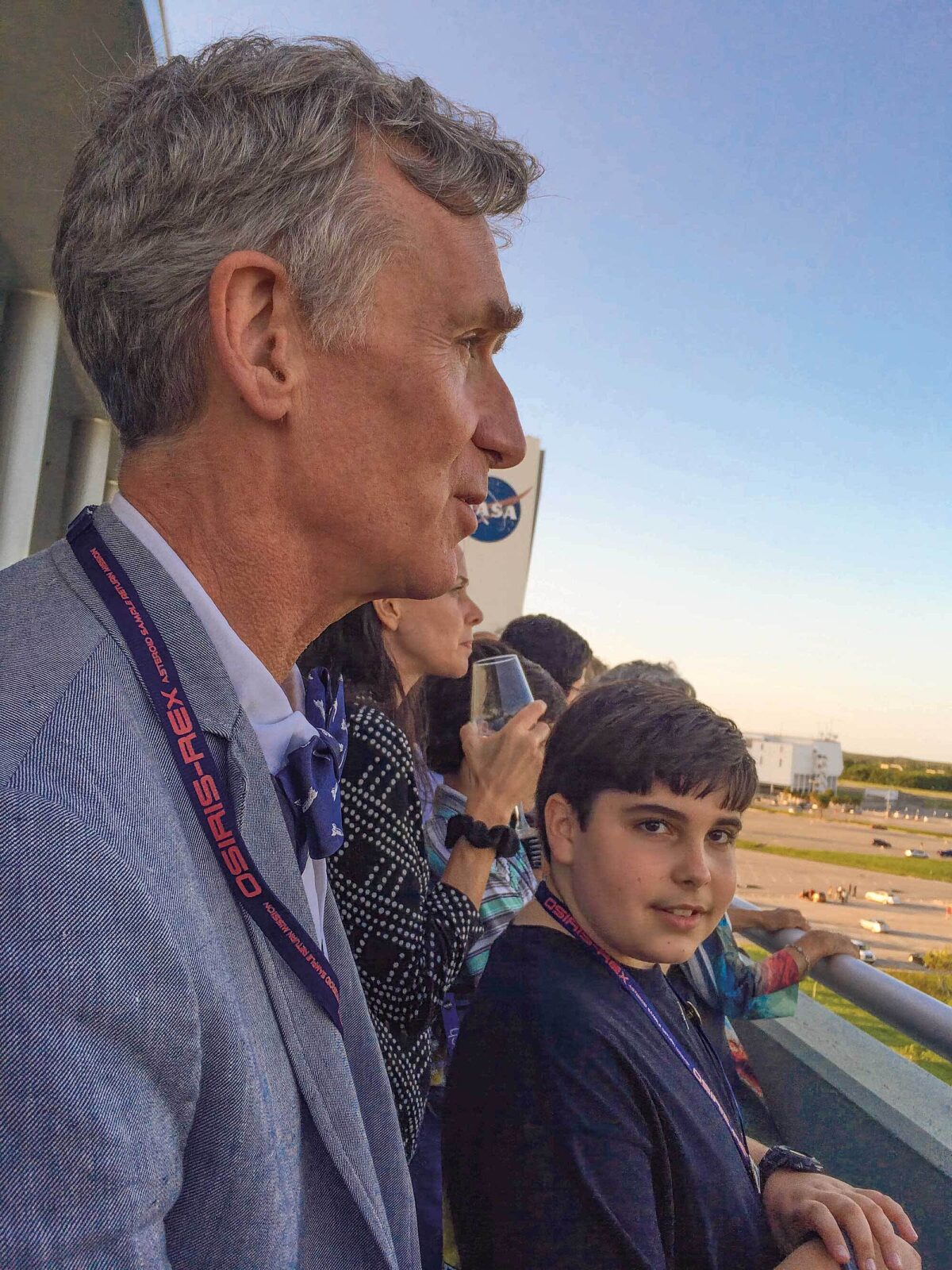Rae Paoletta • Sep 28, 2023
The boy who named Bennu is now an aspiring astronaut
Some people wish upon a shooting star in the hopes their dreams will come true. But Mike Puzio has already outdone that adage; at just nine years old he named an asteroid, and is now working toward his lifelong goal of becoming an astronaut.
In 2013, The Planetary Society ran a contest in which 8,000 entrants from around the world submitted names for what was then known as Asteroid (101955) 1999 RQ36. Mike submitted the name Bennu after an Egyptian deity typically depicted as a heron. He said that the OSIRIS-REx’s solar panels looked like wings and that its Touch-and-Go Sample Mechanism (TAGSAM) arm resembled the curved neck of the aquatic bird.
For Mike, naming Bennu was the beginning of something bigger than any asteroid. He’s spent the last 10 years serving as an ambassador for the OSIRIS-REx mission, inspiring people from all walks of life to get excited about space.
The Planetary Society caught up with Mike and his dad, Larry Puzio, in Salt Lake City, Utah the weekend of the OSIRIS-REx sample return to discuss how missions like it change lives for the better.
This interview has been edited and condensed for clarity.

The Planetary Society: Before we talk about Bennu or the naming contest, I would love to ask you, Mike, how you first got interested in space. When did you first catch the space bug?
Mike Puzio: That would probably be when my father took me to my first — what was then called — astronaut rendezvous. I was about eight at the time, so it was just a bit after I had submitted the name [Bennu], which is honestly incredible that it all panned out that well.
I would love to ask you the same, Larry. What made you fall in love with space?
Larry Puzio: Oh, I've really been into space since I was a kid and grew up watching “Star Trek.” I kind of gave it up through college and med school, thinking, "Well, I've got bad eyes, I couldn't be an astronaut." And in the last decade, I've really gotten back into it. When Mike was learning to read, I wanted to make sure he had lots of books about space and science.

So, as you know, back in 2013 The Planetary Society ran a contest called “Name that Asteroid!,” referring to the asteroid that the OSIRIS-REx mission would be sampling. Around 8,000 people submitted names. What made you decide to enter?
MP: Well, my father said for me to give it a shot, and the worst thing that could happen is that they would say no to my name, and it turns out that didn't happen, which I am very grateful for. So “why not?” is really the only reason why.
I thought the name you suggested, “Bennu,” was so cool because I also loved ancient Egyptian gods and goddesses as a kid. So I’m wondering, did you also like to read a lot about ancient Egypt? Or what inspired you more broadly?
MP: So I've been a big Rick Riordan fan since around the third grade when I was reading a “Percy Jackson” series, which was about the time that I named the asteroid. And then later, I found “The Kane Chronicles,” which was about Egyptian mythology, and that was even cooler.
What made you decide on the name Bennu specifically?
MP: Well, after the mission name had been announced as OSIRIS-REx, I recognized the name Osiris as an Egyptian deity, and I went on Wikipedia to look up what the whole deal with him was and any stories about him. One of them that stood out was his return to Earth as a Bennu or a heron, and I figured that would be fitting as the asteroid would be returning a sample to Earth.
It’s a very good name. Very apt. Do you remember what it was like the moment you won? How did your friends at school find out?
MP: When I found out, I didn't quite know how to take it because I had never had this experience. I'd never seen anybody else experience this. At some point, I asked our principal if it would be okay for the contest results to be part of the morning announcements. She said, "That would be phenomenal.” And so that was how a lot of my classmates found out.
What was it like working with The Planetary Society at that time? How did you hear the news?
MP: There was this lovely individual named Emily Lakdawalla who was in email cahoots with my parents. Initially, she had told them that I had been part of the top five or six — some small number. One of the semi-finalists. But of course, my parents didn't tell me then because they didn't want to get my hopes up, which I thank them for. But I was eventually told by Emily that I had in fact won the competition and I was just dumbfounded.
What a great surprise! How did you manage to keep the secret that long?
LP: Well, since it was just by email and he didn't know, I never let him find out until he was approved as the winner. I really didn't want to get him disappointed at that age. [Larry looks at Mike] Sorry.
Looking back, does it feel like winning that contest had ripple effects on other parts of your life? For example, did it inspire you to become more interested in space or science?
MP: Well, it did kind of thrust me into the whole space thing. Initially, I was a little bit reluctant to actually get into space beyond that because it was more of my dad's thing at the time. But upon realizing how cool space was and after my dad had taken me to a few space events, I decided that it would be really cool to stick with it. So I decided to get more involved with it, doing all sorts of things such as going to the OSIRIS-REx launch back in 2016, and then becoming an OSIRIS-REx ambassador and giving lectures on it.
I think that a lot of people working in space had these moments too, where maybe we didn't come from a formal space science education, but there are just these lightning bolt moments in our lives that bring us into the industry. So right now you're at school at North Carolina State, is that right? And you're studying engineering. Do you eventually want to go into the space sector?
MP: Eventually I'd like to be an astronaut. I'm still clinging to that little eight-year-old dream.
What kinds of missions would you like to go on?
Just be on the crew to any mission really, as I think it was John Glenn who said, "Any spaceflight is a good spaceflight."
Very well said, and I couldn't agree more. It seems like you've given some talks, as you mentioned about OSIRIS-REx over the years. Can you tell me a little bit about that?
MP: That was a little interesting experience because I had to create a slideshow, and actually do more research on it, which turned out to be totally worthwhile. And I don't know, it has opened a lot of doors for me to meet and talk to some really cool people. So I'm pretty glad about it and honestly, it got me to be able to talk to a big crowd.

What do you hope your personal contribution can be to the field of space now that you've had this sort of once-in-a-lifetime opportunity?
MP: All I can hope to do is to inspire other people so that anybody from any age can feel like they can do something about space because it's for everyone, and I mean everyone, to get involved in. It's a really cool part of my life, and I hope it can be a cool part of their lives too.
I couldn't agree more. So as we're sitting here in Salt Lake City, about 10 years after you named Bennu, I’m curious: How do you feel knowing samples from the asteroid you named are about to drop to Earth?
MP: It honestly feels amazing because it's just been something in the works for so long. It's been a big part of my life for a huge amount of time, relatively speaking. And so just the whole culmination of it here in this last weekend is something that feels bittersweet. I've been looking forward to NASA getting all the data back and getting to analyze the asteroid sample. However, it's almost over.
Larry, I'd actually like to ask you the same because I feel like this is a full-circle moment for you as well since you were also at the OSIRIS-REx launch. How do you feel right now?
LP: Oh, it's really phenomenal because back 10 years ago when he was that young, I figured, wow, it'll be a decade before it comes back, I can't imagine what things we'll be doing by then. And it's just been an amazing journey of watching him grow up and watching him get excited about things that I don't even understand all the time, like electrical engineering. But really, it's had a great impact on his life. I love how many opportunities we've had because of this and still look forward to even the next part of the mission to catch up with Apophis.
What are you personally most excited to learn about from the Bennu samples?
MP: I’m personally most excited to learn more about the possible origin of life. Where did we come from? Where are we going, possibly?
And then Larry, I'd like to ask you the same, because I think a lot of people don't realize how much asteroids are almost like time capsules from the beginning of the Solar System.
LP: It's really amazing. Dolores Hill, one of the University of Arizona specialists, really got us turned on to meteorites. She gave us a tour. That's one of her passions. And meteorites really provide pristine samples, because on Earth everything has been recycled or devoured and digested. So there's no way to really study our origins well here, but getting a pristine sample is a really good basis to start with.
And a bit of a change of subject, it also makes me think of one of my favorite T-shirts from the European Space Agency, which is: "The dinosaurs didn't have a space program."

Looking back on your own experience with Bennu and the whole contest, why is it so important to get kids excited about space?
MP: Well, those kids are eventually going to grow up. And if they have a love for space when they're a little kid, then they're going to want to do something with it when they grow up. And even then, if they don't do it, then they'll have that nostalgic feeling when a big space mission does occur, and then they'll remember how NASA made them feel. So I feel like it's important to always develop a love for space in everyone, especially youngsters though.
Absolutely. And Larry, I'd like to ask you the same. Looking back at your experience with this contest and with Mike, why is it important for kids to get excited about space? Where do kids and families fit within this vast space of space?
LP: Well, I've really come to learn how much all of our daily lives are really impacted by developments from the space program. The very idea of cell phones, tiny cameras, and even integrated circuits are just from the Apollo program. And there are books and books out there. NASA releases one every year of spinoffs from their program. But so much of our modern lives is shaped by that field, and nobody seems to be aware or appreciate it. So educating the public really helps.
Do you have a message for our Planetary Society members? Maybe some thoughts or reflections since winning the contest?
MP: Well, if you have the opportunity to do something that you want to do, take it. I did that and don't think it turned out too bad.
LP: I'd say make sure that along with supporting space exploration or The Planetary Society, take the time to write notes to your legislators and really get involved with decisions about space policy. Because if it's done right, it'll really benefit the entire planet.
Support our core enterprises
Your support powers our mission to explore worlds, find life, and defend Earth. You make all the difference when you make a gift. Give today!
Donate

 Explore Worlds
Explore Worlds Find Life
Find Life Defend Earth
Defend Earth


